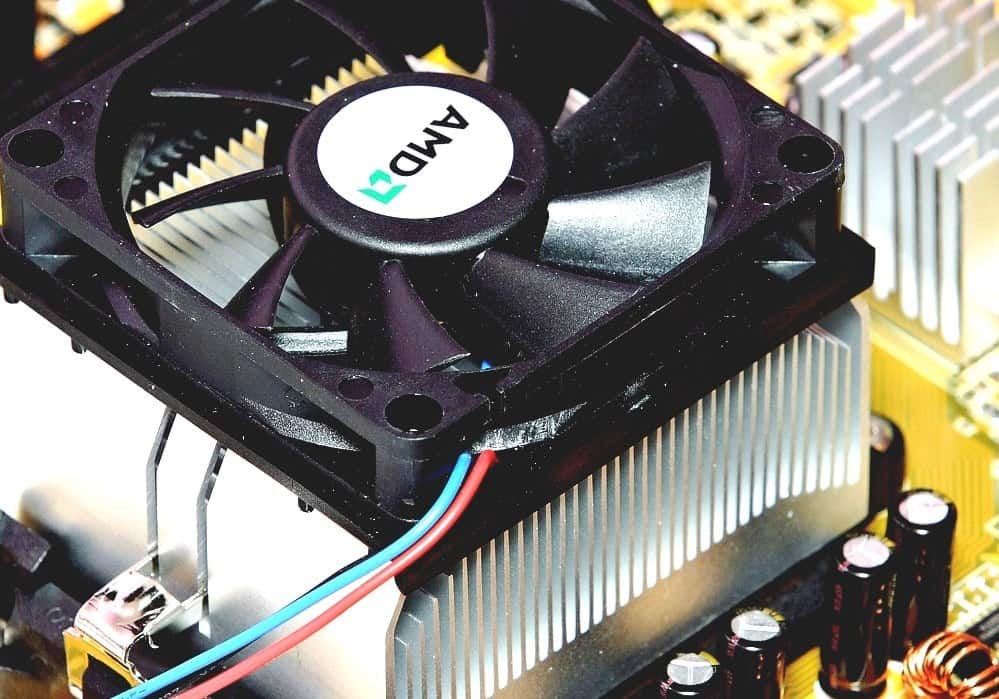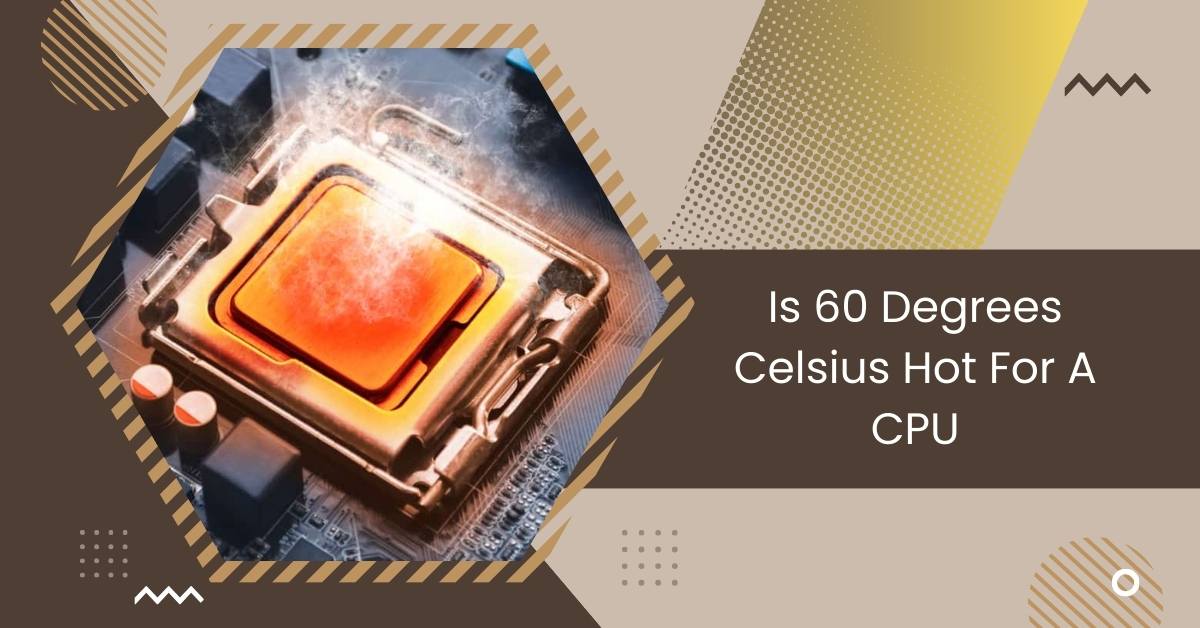In computing, the temperature of a central processing unit (CPU) holds significant importance.
A CPU temperature of 60 degrees Celsius is considered normal and safe during gaming. It’s within the acceptable range for most CPUs and shouldn’t cause any performance issues or damage.
This article will explore the “Is 60 Degrees Celsius Hot For A CPU.”
Safe CPU Temperatures
When it comes to keeping your computer running smoothly, one of the critical things to watch out for is the temperature of your CPU.
This little chip does a lot of work and can get hot. But don’t worry; there are some safe temperatures you should aim for to keep your CPU happy.
Ideally, you want your CPU to stay between 50 and 80 degrees Celsius. If it gets hotter than that, you might run into some problems. So, keep an eye on your CPU temperature and make sure it stays in that safe zone.
Is Your PC Overheating or Just Hot?

It’s essential to distinguish between a PC running hot and one that’s genuinely overheating. If your computer feels warm to the touch, that’s normal, especially during intense gaming or video editing tasks.
However, it might be overheating if it’s uncomfortably hot or exhibiting symptoms like sudden shutdowns or sluggish performance. Check the CPU temperature using monitoring software.
Ideally, it should stay between 50 to 80 degrees Celsius. If it consistently exceeds this range, it’s likely overheating, and you should take action to prevent potential damage.
Are High CPU Temps Dangerous?
High CPU temperatures can indeed be dangerous for your computer. When your CPU gets too hot, it can lead to performance issues, system instability, and even permanent damage to your hardware.
It’s crucial to monitor your CPU temperature regularly and take steps to keep it within safe limits to avoid potential problems and ensure your computer’s longevity.
1. Lowered Performance
When your computer’scomputer’s performance takes a hit, it can be frustrating. One common reason for lowered performance is high CPU temperatures.
When your CPU gets too hot, it can throttle its speed to prevent damage, resulting in slower processing speeds. This can lead to laggy performance, longer loading times, and overall sluggishness.
Keeping your CPU temperature in check is essential to maintain optimal performance for your computer tasks.
2. BSOD And Crashes
Experiencing the dreaded Blue Screen of Death (BSOD) or frequent system crashes can frustrate and disrupt your workflow.
High CPU temperatures are often to blame for these issues. When your CPU overheats, it can trigger system instability, leading to crashes and the infamous BSOD.
Monitoring your CPU temperature and ensuring adequate cooling can help prevent these disruptive events and keep your system running smoothly.
3. Physical Damage
High CPU temperatures can cause more than just performance issues—they can also physically damage your computer hardware.
Prolonged exposure to excessive heat can degrade the components of your CPU, leading to permanent damage and potential failure.
Proper cooling and maintenance practices are essential to keeping your CPU temperature within safe limits to prevent costly repairs or replacements.
4. Lowered CPU Lifetime
When your CPU consistently operates at high temperatures, it can significantly reduce lifespan. Excessive heat stresses the delicate components of the CPU, causing them to degrade over time.
This can lead to premature failure and the need for costly replacements. By maintaining optimal CPU temperatures through effective cooling solutions and regular monitoring, you can extend the life of your CPU and ensure reliable performance for years to come.
Read: Is 80c Safe For CPU – Check CPU Temperature For Safety!
How To Measure CPU Temps

Measuring CPU temperatures is crucial for maintaining optimal performance and preventing overheating. To do this, you can use specialized software known as temperature monitoring programs.
These tools provide real-time readings of your CPU temperature, allowing you to keep track of any fluctuations. Popular options include HWMonitor, Core Temp, and Open Hardware Monitor.
By regularly monitoring your CPU temperature, you can identify potential issues early and take necessary steps to keep your system running smoothly.
Can You Get Different Readings For Each Core?
Yes, getting different temperature readings for each core of your CPU is possible. This occurs because modern CPUs often have multiple cores, each performing tasks independently.
Factors such as workload distribution, cooling efficiency, and thermal conductivity can result in variations in temperature among the cores.
Monitoring software can provide individual core temperature readings, allowing you to identify discrepancies and ensure balanced thermal performance across all cores for optimal CPU health.
How To Reduce CPU Temps
Reducing CPU temperatures is essential for maintaining optimal performance and prolonging the lifespan of your computer. You can adopt various strategies to accomplish this goal.
Firstly, ensure proper airflow within your computer case by installing additional fans and keeping air vents unobstructed.
Additionally, consider upgrading your CPU cooler to a more efficient model or applying high-quality thermal paste for better heat transfer.
Regularly cleaning dust and debris from cooling components can also help improve thermal efficiency and keep temperatures in check.
1. Keep Your Computer Clean
Maintaining a clean computer is essential for optimal performance and longevity. Regularly clean dust and debris from the exterior and interior of your computer using compressed air or a soft brush.
Pay special attention to vents, fans, and cooling components, as accumulated dust can hinder airflow and lead to overheating.
Keeping your computer clean can prevent potential issues and ensure smooth operation for years.
2. Keep Ambient Temperatures Low
Keeping ambient temperatures in your computer’s environment low is essential to helping maintain optimal CPU temperatures.
Ensure that the room where your computer is located is adequately ventilated and cooled, especially during hot weather or in poorly ventilated spaces.
Avoid placing your laptop near heat sources such as radiators or direct sunlight, as this can increase ambient temperatures and strain your CPU cooling system.
Keeping ambient temperatures low helps ensure your CPU operates within safe temperatures and avoids overheating issues.
3. Invest In Strong Fans

Investing in solid fans is a smart move to keep your computer cool and running smoothly. High-quality fans can improve airflow within your computer case, helping to dissipate heat more effectively and maintain lower temperatures.
Look for fans with high airflow and low noise levels to ensure optimal cooling performance without adding unnecessary noise to your system.
By investing in solid fans, you can prolong the lifespan of your components and prevent overheating-related issues.
4. Reduce The Load On Your CPU
Reducing the load on your CPU can lower temperatures and improve overall system performance. One way to do this is by closing unnecessary programs and processes running in the background.
Additionally, consider optimizing your system settings and limiting the number of applications running simultaneously.
Minimizing CPU usage can decrease heat generation and ensure that your computer operates more efficiently and effectively.
5. Check The Thermal Paste
Checking the thermal paste is an essential step in maintaining optimal CPU temperatures. Over time, the thermal paste can degrade or dry out, reducing its effectiveness in conducting heat away from the CPU.
You can improve heat transfer and ensure better thermal performance by periodically inspecting and replacing old or worn-out thermal paste with fresh, high-quality paste.
This simple maintenance task can help prevent overheating and prolong the lifespan of your CPU.
Read: Is 70 Celsius Hot For CPU – Explore CPU Temperature Risks!
What Temperature Should Your CPU Be?

Knowing the ideal temperature for your CPU is crucial for maintaining optimal performance and preventing overheating.
While the specific temperature can vary depending on factors like CPU model and workload, a general rule is to aim for temperatures between 50 to 80 degrees Celsius under load.
Monitoring software can provide real-time temperature readings, allowing you to ensure that your CPU stays within this safe operating range to avoid potential issues and maximize performance.
1. What Should My CPU Temperature Be While Playing Games?
Your CPU temperature may naturally rise when playing games due to increased workload. While there isn’t a specific temperature that applies to all CPUs, keeping your CPU temperature below 80 degrees Celsius is generally advisable to ensure optimal performance and prevent overheating.
However, some CPUs may have different temperature tolerances. Hence, it’s essential to monitor your CPU temperature using software and adjust cooling solutions accordingly to maintain safe operating temperatures during gaming sessions.
Read: What Temperature Is Too Hot For A CPU – Act On Overheating!
In Conclusion
Maintaining optimal CPU temperatures between 50 to 80 degrees Celsius prevents overheating and ensures peak performance. Regular monitoring and implementing cooling strategies discussed in this article can help prolong the lifespan of your CPU and prevent potential issues.
Common Questions
1. Is 65 too hot for CPU?
A CPU temperature of 65 degrees Celsius is generally within acceptable limits and should not cause concern for most CPUs.
2. Is 61 Celsius too hot for CPU?
A CPU temperature of 61 degrees Celsius is considered normal and safe for most CPUs during regular operation.
4. Is 60 C too hot for a GPU?
A GPU temperature of 60 degrees Celsius is typically well within the safe operating range and should not pose any issues for the graphics card.
5. What is the ideal temperature for a CPU?
The ideal temperature for a CPU varies depending on the model and workload but generally falls between 50°C to 80°C under load.
Also Read
- High CPU Temp On Startup – Fix Startup CPU Overheating Now!
- What Is VDDCR CPU Voltage? – Optimize CPU Voltage Settings!
- Will My GPU Bottleneck My CPU: Avoid CPU Bottlenecks – 2024

Hi everyone, Johns Jack here, your approachable tech aficionado! I’m passionate about CPUs and thrive on keeping up with the newest tech developments. Join me as we delve into the dynamic realm of technology! Visit: Techy Impacts

